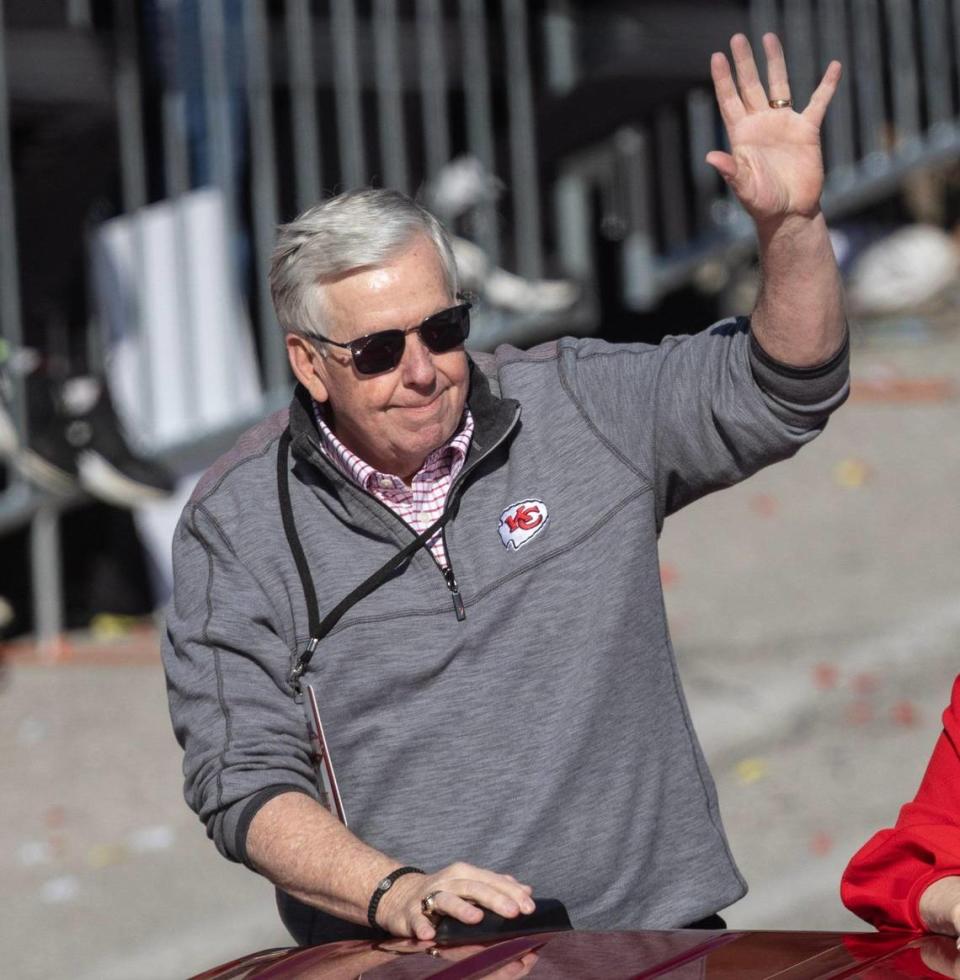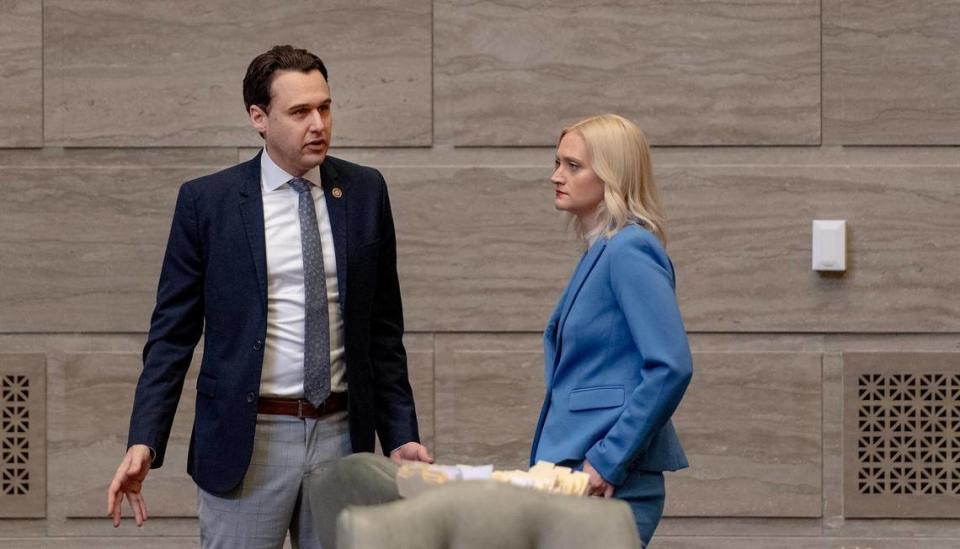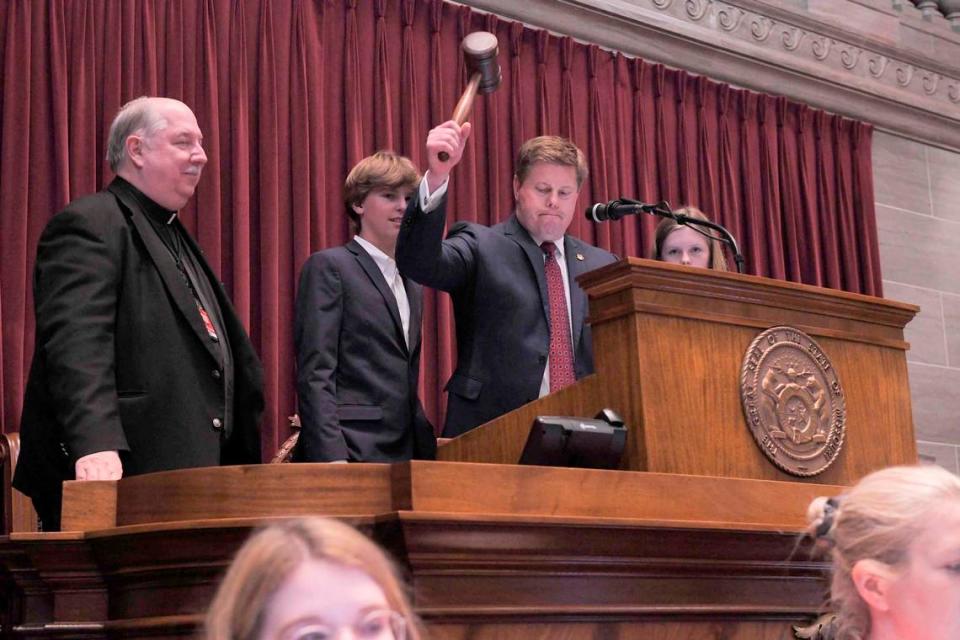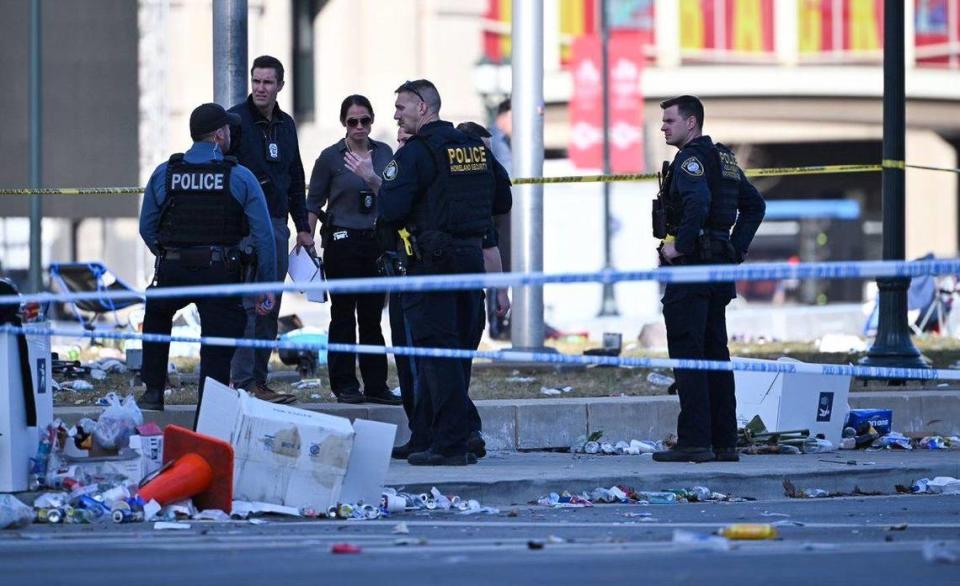Amid fury over KC shooting, Missouri Republicans move to quickly quash gun reform talk
Missouri’s firearms laws, a gun rights fortress that protects concealed weapons and seeks to limit federal law enforcement, was built over the years by state lawmakers brick by brick.
Across Missouri, lawmakers, local officials, members of the public and even Chiefs players themselves are now wondering whether the fortress has any vulnerabilities.
The shooting after the Kansas City Chiefs Super Bowl victory parade on Wednesday that left one person dead and at least 23 shot has immediately provoked the sharpest outcry for changes to the state’s gun laws in years. While Democrats and advocates of additional restrictions have called for action for years, the current fury has few recent parallels.
“It’s one of the most frustrating things,” said Sen. Steve Roberts, a St. Louis Democrat who was at the parade during the shooting. “We have some of the loosest gun laws in the country.”
But Missouri Republicans moved swiftly on Thursday to beat back possible change.
Sen. Bill Eigel, a Weldon Spring Republican campaigning for governor, wrote on social media early Thursday with a warning to those he called “liberal gun grabbers” pushing for restrictions. “NOT IN MISSOURI,” he said.
Even though hundreds of armed police officers were deployed along the parade route and near the rally, Eigel suggested that a lack of guns was somehow responsible for the extent of the shooting.
“One good guy with a gun could have stopped the evil criminals who opened fire on the crowd immediately. Guns don’t kill people. Thugs and criminals kill people,” Eigel wrote.
Kansas City Police Chief Stacey Graves on Thursday said a dispute between several people led to the shooting. Several firearms have been recovered. Two juveniles and one adult have been detained.
Missouri law allows people to carry concealed weapons without a permit. In recent years, lawmakers have lowered the age to have a concealed weapon to 19. And cities and counties are severely restrained in their power to set their own firearms regulations.
Republican Gov. Mike Parson in 2021 signed into law a bill that declared certain federal gun laws “invalid” if they don’t have a state-level equivalent. That law, which faced objections from local police officers, is currently held up in court.
While Kansas doesn’t have an equivalent law seeking to invalidate federal gun laws, the state also allowed concealed weapons without a permit. Many in the Chiefs rally crowd were from the state, and Kansas Democratic state lawmakers – especially those just across the border – have issued their own calls for action.
Some Kansas Republicans are seeking to advance an amendment that would expand protections for gun rights in the state constitution. At a minimum, Democrats say that idea should be shelved.

In Missouri, some Republican state lawmakers have been calling for a further relaxation of firearm regulations, pushing legislation to allow people with concealed carry permits to bring guns onto public transit and inside churches and other places of worship.
“There’s been a mass proliferation in guns in the state of Missouri due to the lack of gun laws that prohibit background checks, red flag laws,” said Missouri Senate Minority Leader John Rizzo, an Independence Democrat.
Rizzo was at the Chiefs celebration when shots were fired. His brother’s friend, a Kansas City police officer, told him to get somewhere safe and pushed him into Union Station. Ten seconds later, the situation became “mass hysteria,” he said.
“I can unequivocally say it is way too easy in the state of Missouri to get guns and ammunition that could harm and hurt and even kill people as we saw today,” Rizzo said.

Republicans restricts gun debate
Parson, who was at the rally, has largely avoided talking about gun laws in the immediate wake of the Kansas City shooting. During an interview on KCMO Talk Radio on Thursday morning, the governor didn’t mention the word “gun” and made no comment on the state’s laws. A written statement on Wednesday also didn’t address rules on firearms.
“Our hearts, our prayers, which doesn’t seem like enough, but it’s all we got to offer right now is for those kids and for those people that’s in that hospital and everybody that had to go through that yesterday,” Parson said in the interview.
Parson canceled a press conference previously scheduled for Thursday afternoon to announce resources he planned to deploy to the southern border.
Missouri House Speaker Dean Plocher, a St. Louis-area Republican, on Thursday largely refused to answer questions about the state’s gun laws and abruptly ended a news conference after he was asked repeatedly about the shooting.
“This is an unfolding investigation,” Plocher, who is running for lieutenant governor, said. “I’m going to reserve comment. I would like you guys to focus on actually what we’re accomplishing for the state of Missouri as an investigation is going on in Kansas City.”
The top Republican lawmaker then went a step further when asked what he intended to do about preventing intentional gunfire. He said he believed Kansas City already has an ordinance that he said “should have prevented what happened.”
But Plocher then immediately said “laws alone don’t solve the problem.” He refused to answer questions about which ordinance he was referring to.
“We will evaluate the investigation as it unfolds and address that,” he said. “We’re not going to dwell on Kansas City today.”
When The Star asked whether Kansas City should be able to enact stricter gun regulations than the state, Plocher cut off the reporter’s question and ended the new conference, saying “we’re done here. Thank you.”

Before Wednesday’s shooting, Kansas City had just emerged from a year in which it broke its homicide record with 184 killings. The problem of gun violence has long confounded local leaders and law enforcement.
But the parade and rally drew hundreds of thousands of revelers from across the region – from rural, suburban and other large cities in both Missouri and Kansas. Dozens of elected officials from both states – including Parson – were also present when the shooting started.
That makes Wednesday’s mass shooting different, said Manny Abarca, a member of the Jackson County Legislature whose district includes the site of the shooting.
“Collectively, you had state, local, county, federal officials all running for their lives at the same time,” Abarca said. “If this isn’t a wake up call for us in America, I don’t know what is.”
Abarca, who chairs the Jackson County Legislature’s Health and Environment Committee, said on Monday the committee will begin hearing testimony on gun violence. He said it is time to legislate.
Any limits on guns Jackson County or Kansas City want to take in response will be severely constrained by long-standing state law largely blocking local governments from imposing their own restrictions on firearms. For 40 years, the General Assembly has retained for itself the sole authority to regulate firearms.
The General Assembly in 1984 passed a bill preempting the authority of local governments to restrict guns except in limited circumstances, such as banning their discharge in city limits. The arguments for and against fell along similar lines to the gun debate today.
During a House committee hearing at the time, proponents said the legislation would allow “uniformity” on firearms across the state. Opponents charged that “what is considered acceptable in rural areas may not be acceptable in urban areas,” according to an official legislative summary of the hearing.
Supporters of giving local governments more power to regulate firearms last year launched a campaign called Sensible Missouri to place an initiative petition on the ballot that would roll back the state’s preemption law. Two petitions have been approved for signature-gathering but the effort has stalled.
“We are still an active group. We’ll still discuss it on both sides of the state, but we are not gathering signatures at this time,” said former St. Louis Circuit Judge Jimmie Edwards, one of the leaders of the initiative.
A February 2023 poll of 900 likely Missouri voters by Saint Louis University and YouGov found 69% of respondents support a minimum age of 21 to purchase a gun; 60% support a 72-hour waiting period to purchase a handgun. The poll didn’t ask about support for local authority over firearms.
Abarca intends to push forward with changes. He all but dared Missouri to try to stop Jackson County.
“Give me an opportunity to sue the state,” Abarca said. “Give me an opportunity to leverage both the city, the county – not just here but in St. Louis, Springfield and Columbia – let’s all sue the state. If that’s what it takes to drag them out, here we come.”
Sen. Mike Cierpiot, a Lee’s Summit Republican who was at the parade, said debates over gun restrictions occur every time a shooting happens.
“I always ask, what could we have done that would have changed this outcome? And, usually, nobody knows,” Cierpiot said. “They just say we got to do something and I agree. I think that we need to look at what happened and then make a decision at that point.”
Cierpiot said he doesn’t think lawmakers should immediately move to reexamine the state law that prohibits cities such as Kansas City from enacting stricter gun laws.
“In places where violence is the highest is where people, law abiding people, are most in need of being able to defend themselves,” he said. “Of course, a public setting like this is not that place. But, no, I just don’t want to say anything should be done until we know the details.”

‘We’re boots on the ground’
In Kansas, Democrats renewed a push for change from the Republican-controlled Legislature. Rep. Jo Ella Hoye, a Lenexa Democrat whose political career began with activism in Moms Demand Action, attended the parade with her 11-year-old son.
Hoye arrived at the Kansas Capitol on Thursday wearing a “we can end gun violence” t-shirt.
“There was everything but better gun laws in Missouri and the state has preempted the City of Kansas City from being able to make decisions for their community that’s gonna make them safer. And Kansas is doing the same darn thing,” Hoye said.
Rep. Mari-Lynn Poskin, a Leawood Democrat, said she was in a restroom at Union Station when crowds started piling in. She was pushed to the floor where she laid face down and spoke with three young girls who were afraid.
Their faces, and those of the families she saw reuniting after police ushered her out of Union Station, Poskin said, are burned in her memory. Afterwards, she spoke to her fellow lawmakers.
“We were just looking at each other like we need to fix this and we’re in a position to do so,” she said.
Republican lawmakers are pursuing an amendment to the Kansas Constitution that could effectively block many future limits on gun ownership – potentially providing more robust protections for gun rights than what the U.S. Constitution offers.
The proposal would establish a fundamental right to own and use ammunition, firearm accessories and components alongside firearms. It would require courts to examine any restrictions on gun rights using a strict scrutiny standard.
Kansas Senate Minority Leader Dinah Sykes, a Lenexa Democrat, wasn’t optimistic that meaningful changes to gun law would occur in Kansas in response to the shooting. But at a minimum, she urged lawmakers not to move forward with the amendment, which is still in committee in the House.
“You should not have to worry to go out in a public event,” said Sykes, who had been part of a group of VIPs ushered to buses behind Union Station before much of the mayhem ensued.
Kansas House Majority Leader Chris Croft, an Overland Park Republican, did not directly respond to a question about whether the shooting, which occurred amid a large concentration of law enforcement, should cause lawmakers to reevaluate gun policy.
Croft called the shooting a horrible tragedy and his focus at the current time was on the victims and others affected. “I hope we can soon get a fuller picture of what happened leading up to this and that the perpetrators are prosecuted to the fullest extent of the law,” he said.
But for Rizzo, the Missouri Senate Democratic leader, Wednesday’s shooting was the kind of situation supporters of stricter gun laws have been warning about.
“These are the events that matter when the Republicans in Jefferson City decided to take control away from local officials in Kansas City,” he said. “We’re boots on the ground, right? And we can see and react to things differently than what you can from Jefferson City.”


